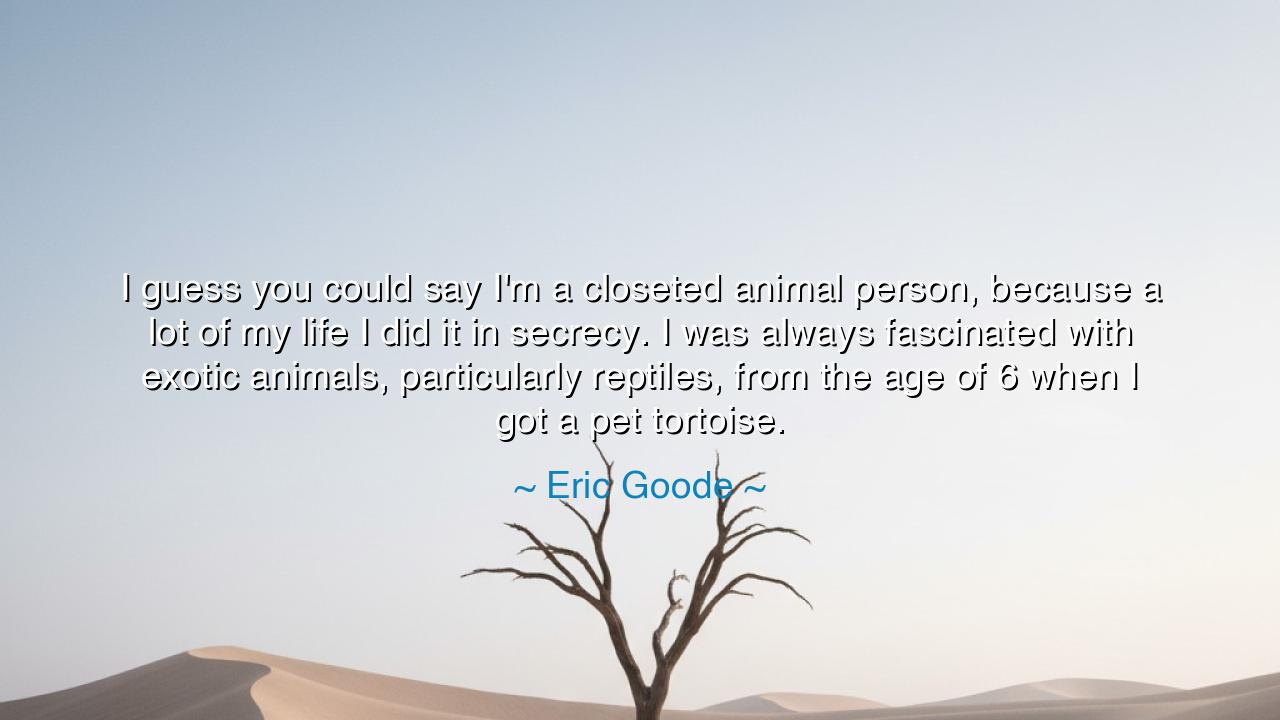
I guess you could say I'm a closeted animal person, because a lot
I guess you could say I'm a closeted animal person, because a lot of my life I did it in secrecy. I was always fascinated with exotic animals, particularly reptiles, from the age of 6 when I got a pet tortoise.






"I guess you could say I'm a closeted animal person, because a lot of my life I did it in secrecy. I was always fascinated with exotic animals, particularly reptiles, from the age of 6 when I got a pet tortoise." – Eric Goode
In the grand narrative of human experience, there are many quiet passions that grow within us, hidden beneath the surface of everyday life. Eric Goode, in his reflection on his deep connection with animals, particularly exotic reptiles, speaks of a fascination that began in the innocence of childhood—a bond forged not through external approval but through a profound, almost sacred, connection to the natural world. To be fascinated with reptiles, creatures often misunderstood or feared, is to recognize that the world is filled with mysteries that beckon us to look deeper, beyond the surface of what is familiar.
Since ancient times, mankind has had a unique relationship with the animal kingdom. The Greeks, in their reverence for the natural world, saw animals as symbols of certain virtues and characteristics. Heracles, the great hero, encountered many beasts on his journey, each representing a test of strength, intelligence, or courage. Yet, even the mighty heroes of the past had moments of quiet reverence for nature, moments where the animal world was not a force to conquer, but a realm to understand. In this, Goode’s love for reptiles mirrors a deeper, ancient connection—a recognition that animals, particularly those considered strange or dangerous, carry their own wisdom and mysteries.
Goode’s secrecy about his passion for animals highlights the internal struggles we often face when our interests fall outside the norm. To speak of one’s love for exotic animals, particularly in the context of reptiles, is to step outside the bounds of conventionality. Just as the philosophers of ancient Greece—Socrates and Plato—were often misunderstood in their time for their unconventional ideas, so too are those who harbor deep, personal fascinations that lie beyond society’s expectations. But in their defiance, both in ancient times and today, lies wisdom: to be true to oneself, even when the world around you cannot understand or appreciate your passion.
The tortoise that Goode received at the age of 6 represents more than just a pet; it is a symbol of patience, endurance, and the quiet, slow progress of understanding. In ancient symbolism, the tortoise was often associated with wisdom and steadfastness—qualities that transcend the fast-paced, ever-changing world around us. Much like the tortoise, Goode’s connection to animals represents a journey of slow and deliberate discovery, one that unfolds over time, not for external validation, but for personal fulfillment.
There is a lesson in this: in a world that often values conformity, we must remember that the path of self-discovery is a deeply personal journey, one that may require us to hide parts of ourselves from others, even if only temporarily. Consider the story of Leonardo da Vinci, who, while admired for his genius in art and science, also had a deep fascination with anatomy and the natural world. His private studies of the human body and his fascination with nature were kept secret for much of his life, as society was not yet ready to understand the full scope of his intellectual pursuits. Like Goode’s secret love for reptiles, da Vinci’s passion was his own, nurtured in the quiet corners of his mind and studio.
In the same vein, Goode’s connection to animals, though kept hidden for much of his life, eventually became a powerful driving force in his work. It was not just a secret hobby but a deep calling, one that would lead him to establish wildlife preservation efforts and share his knowledge with the world. His story teaches us that our passions, no matter how obscure they may seem, hold the potential to shape our destinies. Often, the quietest of loves can fuel the most powerful of transformations. Authenticity, then, becomes the key to finding fulfillment—not in what others think, but in the courage to pursue what speaks to our deepest selves.
The practical lesson we can glean from Goode’s story is this: never underestimate the power of the hidden passions within us. The world may not always recognize or understand the things that we cherish, but these passions hold the potential to transform not just our own lives, but the world around us. Let us nurture our interests, even the ones we keep in secret, for they may one day reveal their power when the world is ready to listen. And in doing so, we honor the ancient wisdom that has always been passed down: the pursuit of truth and knowledge, no matter how obscure, is never in vain.






AAdministratorAdministrator
Welcome, honored guests. Please leave a comment, we will respond soon